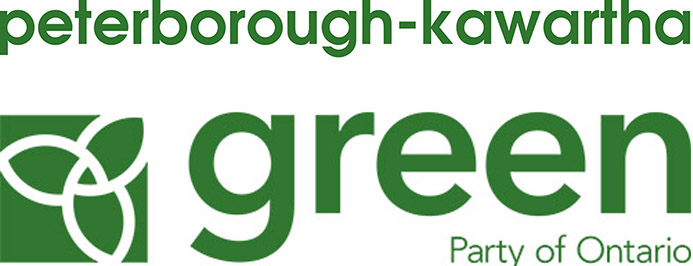Green Party Values
These Principles of the Global Greens Charter, as ratified by the Global Greens at its founding conference on April 16, 2001, in Canberra, Australia, are enshrined in the constitution fo the GReen Party of Canada.
Ecological Wisdom
We acknowledge that human beings are part of the natural world and we respect the specific values of all forms of life, including non-human species.
We acknowledge the wisdom of the indigenous peoples of the world, as custodians of the land and its resources.
We acknowledge that human society depends on the ecological resources of the planet, and must ensure the integrity of ecosystems and preserve biodiversity and the resilience of life supporting systems.
This requires:
- that we learn to live within the ecological and resource limits of the planet.
- that we protect animal and plant life, and life itself that is sustained by the natural elements: earth, water, air and sun.
- where knowledge is limited, that we take the path of caution, in order to secure the continued abundance of the resources of the planet for present and future generations.
Social Justice
We assert that the key to social justice is the equitable distribution of social and natural resources, both locally and globally, to meet basic human needs unconditionally, and to ensure that all citizens have full opportunities for personal and social development.
We declare that there is no social justice without environmental justice, and no environmental justice without social justice.
This requires:
- a just organization of the world and a stable world economy which will close the widening gap between rich and poor, both within and between countries; balance the flow of resources from South to North; and lift the burden of debt on poor countries which prevents their development.
- the eradication of poverty, as an ethical, social, economic, and ecological imperative.
- the elimination of illiteracy.
- a new vision of citizenship built on equal rights for all individuals regardless of gender, race, age, religion, class, ethnic or national origin, sexual orientation, disability, wealth or health.
Participatory Democracy
We strive for a democracy in which all citizens have the right to express their views, and are able to directly participate in the environmental, economic, social and political decisions which affect their lives; so that power and responsibility are concentrated in local and regional communities, and devolved only where essential to higher tiers of governance.
This requires
- individual empowerment through access to all the relevant information required for any decision, and access to education to enable all to participate.
- breaking down inequalities of wealth and power that inhibit participation.
- building grassroots institutions that enable decisions to be made directly at the appropriate level by those affected, based on systems which encourage civic vitality, voluntary action and community responsibility.
- strong support for giving young people a voice through educating, encouraging and assisting youth involvement in every aspect of political life including their participation in all decision making bodies.
- that all elected representatives are committed to the principles of transparency, truthfulness, and accountability in governance.
- that all electoral systems are transparent and democratic, and that this is enforced by law.
- that in all electoral systems, each adult has an equal vote
- that all electoral systems are based on proportional representation, and all elections are publicly funded with strict limits on, and full transparency of, corporate and private donations.
- that all citizens have the right to be a member of the political party of their choice within a multi-party system.
Nonviolence
We declare our commitment to nonviolence and strive for a culture of peace and cooperation between states, inside societies and between individuals, as the basis of global security. We believe that security should not rest mainly on military strength but on cooperation, sound economic and social development, environmental safety, and respect for human rights.
This requires
- a comprehensive concept of global security, which gives priority to social, economic, ecological, psychological and cultural aspects of conflict, instead of a concept based primarily on military balances of power.
- a global security system capable of the prevention, management and resolution of conflicts.
- removing the causes of war by understanding and respecting other cultures, eradicating racism, promoting freedom and democracy, and ending global poverty.
- pursuing general and complete disarmament including international agreements to ensure a complete and definitive ban of nuclear, biological and chemical arms, anti-personnel mines and depleted uranium weapons.
- strengthening the United Nations (UN) as the global organisation of conflict management and peacekeeping.
- pursuing a rigorous code of conduct on arms exports to countries where human rights are being violated.
Sustainability
We recognise the limited scope for the material expansion of human society within the biosphere, and the need to maintain biodiversity through sustainable use of renewable resources and responsible use of non-renewable resources. We believe that to achieve sustainability, and in order to provide for the needs of present and future generations within the finite resources of the earth, continuing growth in global consumption, population and material inequity must be halted and reversed. We recognise that sustainability will not be possible as long as poverty persists.
This requires:
- ensuring that the rich limit their consumption to allow the poor their fair share of the earth’s resources.
- redefining the concept of wealth, to focus on quality of life rather than capacity for over-consumption.
- creating a world economy which aims to satisfy the needs of all, not the greed of a few; and enables those presently living to meet their own needs, without jeopardising the ability of future generations to meet theirs.
- eliminating the causes of population growth by ensuring economic security, and providing access to basic education and health, for all; giving both men and women greater control over their fertility.
- redefining the roles and responsibilities of trans-national corporations in order to support the principles of sustainable development.
- implementing mechanisms to tax, as well as regulating, speculative financial flows.
- ensuring that market prices of goods and services fully incorporate the environmental costs of their production and consumption.
- achieving greater resource and energy efficiency and development and use of environmentally sustainable technologies.
- encouraging local self-reliance to the greatest practical extent to create worthwhile, satisfying communities.
- recognising the key role of youth culture and encouraging an ethic of sustainability within that culture.
Respect for Diversity
We honour cultural, linguistic, ethnic, sexual, religious and spiritual diversity within the context of individual responsibility toward all beings. We defend the right of all persons, without discrimination, to an environment supportive of their dignity, bodily health, and spiritual well-being We promote the building of respectful, positive and responsible relationships across lines of division in the spirit of a multi-cultural society.
This requires:
- recognition of the rights of indigenous peoples to the basic means of their survival, both economic and cultural, including rights to land and to self determination; and acknowledgment of their contribution to the common heritage of national and global culture.
- recognition of the rights of ethnic minorities to develop their culture, religion and language without discrimination, and to full legal, social and cultural participation in the democratic process
- recognition of and respect for sexual minorities.
- equality between women and men in all spheres of social, economic, political and cultural life.
- significant involvement of youth culture as a valuable contribution to our Green vision, and recognition that young people have distinct needs and modes of expression.

Left? Right? Green!
This is a copy of The Left? The Right? by Elizabeth May, January 14, 2019
https://www.greenparty.ca/en/blog/2019-01-14/left-right
Last week, Maclean’s requested Elizabeth May’s Green perspective on a piece they were working on about the current left-right spectrum of Canadian politics. Elizabeth May responded that Greens do not fit cleanly on that spectrum, and recent history suggests, neither do most other parties, pointing out that left and right is the wrong perspective to have. Maclean’s stuck to their over-simplification.
We thought you deserved to read our more up-to-date and nuanced response to what has traditionally been referred to as the left and right.
What follows was sent to Maclean’s by Elizabeth May, prior to their publishing of this article: https://www.macleans.ca/politics/why-were-calling-out-the-left-and-the-r…
———————————–
From the point of view of Greens, the whole idea of a left-right dichotomy is something of an anachronism. In the 19th century, and even into the early 20th century, the ideological camps of Left and Right were easy to spot.
Conservatives could be clearly defined as those who concerned themselves with fiscal prudence, while social democrats prioritized the general welfare of society. But in the latter part of the 20th century, so-called liberalism blurred and conservatives ignored elements of their intellectual well-spring of “conserving” core values in society. With the destruction in Canada of the Progressive Conservative Party, conservatives moved to more radical propositions. And traditional liberals and social democrats shifted toward centrism, along the lines of Tony Blair’s “Third Way” and Bill Clinton’s “the days of big government are over.”
Today, we find voters in modern democracies divided on lines that have less to do with “left” and “right” and more to do with “insiders” and “outsiders.” In terms of the “Occupy” movement, we are divided between the one percent and the 99%.
How else can one explain pundits who found similarities in appeal between Donald Trump and Bernie Sanders? In policy terms, they could not have been farther apart. Still, both were perceived as appealing to a rising tide of populism. The same thing is happening globally and having the effect of putting wind in the sails of Greens. I serve as co-chair of the Global Greens Parliamentarians Association, with over 400 elected MPs around the world. We compared notes at the recent climate conference in Poland at COP24. Of the environment and climate ministers called in to run the key focused negotiations at COP24, four were Green Party Ministers, from Europe, Scandinavia and New Zealand.
While the common political discourse still categorizes parties of the “left” or the “right,” Greens believe we have more in common once we reject those labels.
The weirdness of our current climate debate in Canada is that the Conservative Party has decided to focus on attacking carbon pricing – a tool developed by US conservatives as a market mechanism, preferable in their ideology to regulation. Liberals are pitching market based tools to respond to the climate emergency, but Liberals remain wholly entrenched in Harper’s programme designs, and have maintained Harper’s climate target. The NDP is fractured by the appalling policies of NDP Premier Notley and the challenge for a leader without a seat in the House to stake any clear policy.
If any of the old line parties absorbed the IPCC report from October 2018, we would all be working to eliminate fossil fuels as quickly as possible, while building the new clean economy that will create new jobs decentralized across Canada. Greens are fully committed to social justice, the elimination of poverty, fiscal prudence (ie “living within our means environmentally and economically”) to engaged foreign policy pushing for a robust investment in global climate action, achieving the Sustainable development goals, full reconciliation with indigenous peoples, and making decisions now for the benefit of our children. We are hard to peg as left or right. We just think Green values make sense in the 21st Century.



Recent Comments